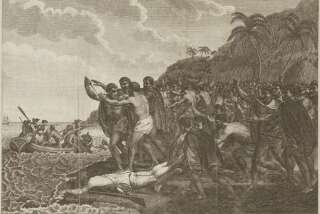‘COLUMBUS’: SHIP OF FOOLISHNESS
- Share via
Christopher Columbus discovers amore.
There is a scene early in the gooey two-part “Christopher Columbus” on CBS (8 p.m. Sunday and Monday on Channels 2 and 8) in which Chris has his fortune told by a Gypsy in 1476: “I see much hardship, but your name will be famous.”
Your name is Clark Gable.
All right, Gable is my contribution. But the line would have worked in this bloated six-hour rendition, an Italian and Bavarian production (in association with Lorimar) that is really two slow stories in one.
On the one hand, the $15-million “Christopher Columbus” is a magnificently staged and photographed (in Malta, Spain and the Dominican Republic) account of the troubles and navigational triumphs of history’s most famous sailor next to Popeye. Columbus opened Europe’s eyes to another world.
The other story about Chris “the man,” gratuitously dribbled out in inserts, is reflected in this ratings sweeps advertisement run by CBS:
Three women captivated him.
To his wife he gave his heart. To his mistress, his passion. And to his queen, a new world .
And you suspect from the meaningful glances that pass between the Genoan Chris (Gabriel Byrne) and Spanish Queen Isabella (a waxen Faye Dunaway) that their “new world” may have included some fascinating explorations in the prone position. You know, undies before Indies.
Though often betrayed by other elements of the production, Byrne is actually very good as Columbus, who is depicted here as a passionate and deeply religious idealist whose seamanship and navigational exploits were unparalleled. And, in this version at least, his other exploits were not a wash either.
The first hour finds him studying his navigational charts by day, the body of Dona Felipa Perestrello by night. He marries her. Shortly after giving birth to their son, Diego, she falls mortally ill while Chris is in Portugal studying his charts. She lasts just long enough to tell Chris: “Your heart was always yearning for what lies beyond the western skies.”
So much for Dona Felipa.
Chris’ eyes light up as he watches the spicy peasant girl Beatriz Enriquez and her friends stomp grapes. You know something’s up when she coyly says, “This will be a special vintage.”
One night he walks in on Bea, who is lying before a roaring fire wearing nothing but a sheet discreetly covering some of her in the right places. Later, she bears him a son.
All the while Columbus is lobbying Ferdinand and Isabella to finance his plan to open up a new sea route to the Orient. It takes him seven years and two hours of TV to win their consent.
Directed by Alberto Lattuada and photographed by Franco di Giacomo, “Christopher Columbus” is a beautiful production, with almost every frame resembling a museum painting. It’s interesting to see some of the politics behind Columbus’ first voyage and the difficulty he has in setting sail. And the cruelty of some of the Spaniards toward the American Indians is appropriately documented here.
But slow? This is TV you can watch while reading a book.
At sea, Admiral Columbus and his men work a lot, sleep a lot, argue a lot and sing a cappella.
They finally land in the Bahamas, which Columbus mistakes for the Indies and names San Salvador. Later, they sail to the island that is now Haiti and the Dominican Republic, where they are befriended by a local chief named Guacanabo.
This is where “Christopher Columbus” breaks exciting new historical ground. Not only did Columbus introduce Europe to another world, we learn from the screen, but he also did something far more spectacular.
He discovered the first Samurai American Indian.
If Chief Guacanabo looks a little different from the other natives, there is good reason. The actor playing him is Hal Yamanouchi, a Japanese.
Meanwhile, the English dialogue for some of the Italian actors has been dubbed, and it shows, and some of the scenes are as laughably bad as others are good.
When a returning Columbus whispers his accomplishments to Isabella, a huge crowd behind them erupts in shouts and applause. How did they hear what he said?
And if the numerous romantic interludes seem artificial, so does the intense rivalry between Columbus and Martin Pinzon (a sneering Oliver Reed), who tries to steal the admiral’s glory. Is Pinzon real or a plot device?
“Christopher Columbus” raises anew the question of TV docudrama and the small screen’s role as our foremost contemporary historian. For better or for worse, “Christopher Columbus” now becomes the nation’s standard work on the subject.
“You know he discovered America . . . ,” another CBS advertisement says about Columbus. Oh? If he discovered America, then the natives he encountered there discovered him , too.
I see much hardship for them, but their names won’t be famous.
More to Read
The complete guide to home viewing
Get Screen Gab for everything about the TV shows and streaming movies everyone’s talking about.
You may occasionally receive promotional content from the Los Angeles Times.






